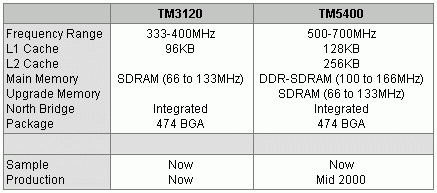Peterj schrijft: "Transmeta heeft haar nieuwe processor vandaag geintroduceerd. De Crusoe is voornamelijk bedoeld voor mobile computing. Het unieke van deze processor is de special door Transmeta ontwikkelde morphing technieken, waardoor de processor structuur (Intel X86) overbodig wordt. De processor heeft een soort virtual machine draaien die de instructie set van b.v. de intel x86 kan emuleren. Linus Torvald himself heeft intensief meegwerkt aan de ontwikkeling van de processor. Misschien in de toekomst een processor met firmware upgrades? Voorlopig blijft de produktie beperkt tot mobile devices."
Er zal dus zowel een high-end (max 700MHz) als een low-end (max 400Mhz) versie komen. Hieronder een tabelletje met de specificaties:
 |
Hieronder wat gedeeltes uit dit artikel van C|NET:
At a technology disclosure conference here that has been anticipated for months, Transmeta said that it will come out with two fairly inexpensive, low-voltage processor families that can run the same software that Intel chips can because of Transmeta's "code-morphing" software. With Crusoe chips, customers will be able to buy cheaper notebook computers that can run all day on batteries without recharging. The chips can also be upgraded remotely, the company said.The first chip, a low-power chip called the Crusoe 3120, will run at about 400 MHz and go into handheld devices and Internet appliances running Linux, said Steve Johnson, head of software operations at Transmeta. A version of Linux called "Mobile Linux" will be released for this chip, said Linux creator and Transmeta employee Linus Torvalds. The chip will cost between $65 and $89 and is in production. IBM will manufacture the chips.
A second chip, called the Crusoe 5400, will run at between 500 MHz and 700 MHz and include a 256K secondary cache integrated into the chip. This chip will be targeted at Windows-technology and will run on one watt of power, far less than its Intel counterparts. Coming midyear, the 5400 will cost between $119 to $329, depending on the speed. The new chips make it clear that Transmeta is both trying to capitalize on some of the shortcomings of Intel's processors while avoiding the mistakes made by processor companies that have tried and failed to break into this market.
Transmeta's chips will consume little power, a lingering problem for Intel. The 3120, for instance, will consume an average of one watt compared to a typical Celeron processor that consumes between four and 10 watts.
[...]
The performance of the 5400 running at 667 MHz is about the same as a Pentium III running at 500 MHz, said Doug Laird, vice president of product development. However, Transmeta is encouraging the use of benchmarks that account for the temporary lag during the translation and for the extended battery life the chips will enable.
The use of software to handle most of the technology's features means that further performance improvements and bug fixes can be distributed later without having to resort to cumbersome changes to the chip design itself, said Jim Chapman, vice president of marketing.
[...]
Initial devices to be introduced will be "Webpads" and other portable devices smaller than PCs costing $500 to $1,000. And later, by midyear, laptops weighing between 3 and 4 pounds and costing $1,200 and $2,500 will be released, Transmeta said.
The processor-software combination has serious potential but isn't an immediate threat to Intel, said Linley Gwennap of the Linley Group. He doesn't expect major computer manufacturers to get on board until the chip has had a chance to prove itself.
[...]
The 3120 will be made on the 0.22-micron manufacturing process while the 5400 will be made on the more advanced 0.18-micron process. Both chips will use a combination of hardware and software to emulate an Intel compatible chip.
Als je overigens de presentatie wilt zien van de Crusoe processor kun je hier terecht bij C|NET. Erry meldt verder dat ZDNet ook een informatief stukkie over dit onderwerp heeft.

